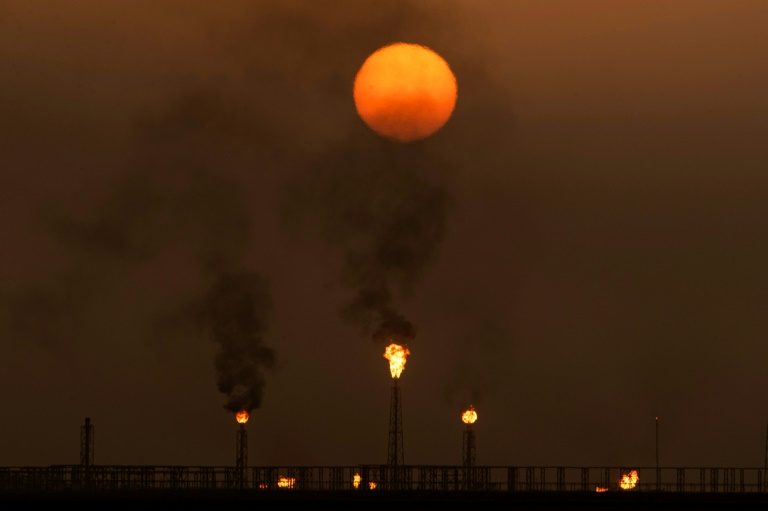Flare stacks in Iraq burn off excess gas: the COP27 talks have been dominated by calls for wealthier nations to step up their commitments to cut greenhouse gas emissions
The United States sought to reassure the UN climate summit in Egypt on Tuesday that it will stick to its energy transition even if Republicans triumph in midterm elections.
The COP27 talks have been dominated by calls for all nations to step up their commitments to cut greenhouse gas emissions, and for rich ones to fulfil pledges to financially help the developing world to green their economies and build resilience.
Poor and climate-vulnerable economies devastated by natural disasters have demanded compensation for damages already incurred, with calls for a windfall tax on the profits of oil companies to help pay.
But stiff international criticism of Egypt’s treatment of hunger-striking activist Alaa Abdel Fattah and the US midterm election also loomed large over the summit.
US President Joe Biden’s Democrats face a tough battle to hang on to their majority in Congress against Republicans, who are less favourable to international climate action.
A Republican victory could be a boon to the ambitions of former president Donald Trump, who is expected to make another bid for the White House.
Trump pulled the United States out of the 2015 Paris Agreement on climate change. Biden returned the United States — the second-largest emitter of greenhouse gases after China — to the pact on his first day in office in 2020.
Biden won a major victory earlier this year when Congress passed the Inflation Reduction Act, which will channel hundreds of billions towards green energy initiatives.
– ‘More determined than ever’ –
The “climate crisis doesn’t just threaten our infrastructure, economy and security — it threatens every single aspect of our lives on a daily basis,” US climate envoy John Kerry said on the sidelines of the summit, in the Red Sea resort of Sharm el-Sheikh.
He said that even if Democrats lose the election, “President Biden is more determined than ever to continue what we are doing.”
“And most of what we are doing cannot be changed by anybody else who comes along,” Kerry said. “The marketplace has made its decision to do what we need to do to respond to the climate crisis.”
Some 100 world leaders were attending the summit on Monday and Tuesday, but Biden will only come on Friday after the midterms.
Nations worldwide are coping with increasingly intense natural disasters that have taken thousands of lives this year and cost billions of dollars, including devastating floods Pakistan, droughts in Africa and unprecedented heatwaves across three continents.
The world is “burning up faster than our capacity for recovery,” Pakistani Prime Minister Shehbaz Sharif told fellow leaders.
Fallout from the energy crunch caused by Russia’s invasion of Ukraine has also cast a shadow on the summit.
Ukrainian President Volodymyr Zelensky made an appearance via video-link, warning that Russia’s war was “destroying the world’s ability to work united for a common goal”.
– ‘Planet is burning’ –
Countries are under pressure to step up efforts to reduce emissions to meet the most ambitious Paris Agreement goal of preventing temperatures from rising by more than 1.5 degrees Celsius above the pre-industrial era.
China’s climate envoy, Xie Zhenhua, told the summit that his country’s commitment to global efforts “will not retreat” — a day after UN chief Antonio Guterres urged Beijing and Washington to step up their efforts.
The leaders of Colombia and Venezuela, meanwhile, launched a call for a wide-ranging alliance to protect the Amazon, a crucial lynchpin of the global climate system.
A UN-backed report said developing countries and emerging economies, excluding China, need investments well beyond $2 trillion per year by 2030 if the world is to stop the global warming juggernaut.
One after the other, leaders of developing nations called for the establishment of a “loss and damage” fund that would compensate them for the here-and-now destruction caused by natural disasters, arguing that rich nations are responsible for the biggest share of planet-heating emissions.
Sharif pleaded for help after the recent floods in Pakistan had cost his country more than $30 billion in loss and damage: “How on earth can one expect from us that we will undertake this gigantic task on our own?”
Antigua and Barbuda Prime Minister Gaston Browne — speaking on behalf of a group of small island nations endangered by rising sea levels and tropical storms — said it was time to tax the windfall profits of oil companies to pay for loss and damage.
“While they are profiting, the planet is burning,” Browne said.









